July 2019 1st Edition
July 2019 1st Edition Joy
Translations
Better care for pregnant moms ahead
Better care for pregnant moms ahead Ursula Researchers at the Council for Scientific and Industrial Research (CSIR) and the South African Medical Research Council (SAMRC) have developed a low-cost Doppler ultrasound device that will be used by nurses at primary healthcare clinics.
Researchers at the Council for Scientific and Industrial Research (CSIR) and the South African Medical Research Council (SAMRC) have developed a low-cost Doppler ultrasound device that will be used by nurses at primary healthcare clinics.
The ultrasound device is called Umbiflow and it is used to monitor the umbilical blood flow between the pregnant mother and the foetus. The umbilical blood flow provides nutrition to the foetus.
Umbiflow can be used to assess foetuses considered to be small for their development stage in the womb.
According to Jeremy
Wallis, who heads up the team that developed Umbiflow, the device was initially tested in a Mamelodi clinic, and the results showed that it could reduce the stillbirth rate by 50 percent.
“Currently, clinical trials funded by the SAMRC are ongoing in nine provinces across the country. We are also running international clinical trials in Kenya, Rwanda, Ghana, Gambia, and India, and these are being funded by the World Health Organisation. An additional study has taken place in Pakistan, which was funded by the Bill and Melinda Gates Foundation,” said Wallis.
Wallis said the CSIR is in discussions with the National Department of Health about the device’s impact and once the clinical evidence has been verified, the department will need to update its basic antenatal care protocol which will pave the way for the widespread rollout of the device in South Africa.
“The benefits of this device will go a long way in improving healthcare for pregnant women and unborn babies in rural and low-resource primary healthcare settings,” he said. Doppler measurement of umbilical blood flow is currently being used by specialists in tertiary hospitals and the private sector.
With the new research being coducted by the CSIR, nurses in primary healthcare clinics will also be able to use the device.The CSIR’s Dr Rachel Chikwamba said it is critical to be able to make the distinction between a foetus that is naturally small and one that is small because of medical reasons.
“This is critical in decongesting our primary healthcare services. For example, if the foetus is small because it is just small then there is no need to refer the mother upwards in the healthcare hierarchy, but if the baby is small because there is a problem then the mother can urgently be referred to get the necessary medical attention,” said Dr Chikwamba.
Boost the economy by buying local
Boost the economy by buying local angenithaPresident Cyril Ramaphosa says government will stimulate local demand and grow South African manufacturing by making sure that the ‘Buy Local’ campaign is everywhere and ever-present.
He said this when he delivered the State of the Nation Address (SoNA) in Cape Town, where he showed up dressed in a suit, shirt and a tie that were locally made by textile workers working at the House of Monatic in Saltriver, Cape Town.
“Let us all buy locally-made goods to drive up demand in our economy,” he added.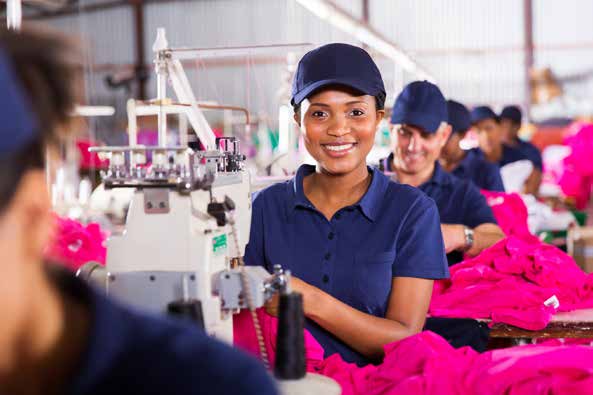
Within this next year, President Ramaphosa said government seeks to conclude agreements with retailers to stock more South African goods on their shelves and to actively promote the great products made by South African hands.
At the same time, government will promote South African products more actively to the rest of the African continent and the world.
“These measures are underpinned by our strong commitment to a macroeconomic and fiscal policy framework that will continue to boost confidence and investment,” he said.
Supporting youth in rural communities
The President also said government will support tech-enabled platforms for self-employed youth in rural areas and townships.
He said small business incubation centres will be rolled out to provide youth-driven start-ups with financial and technical advice as they begin their journeys.
On the eve of SoNA, President Ramaphosa met with several young South Africans who are doing amazing work to build the country and develop local communities.
The meeting was organised by the Presidency together with the National Youth Development Agency for the President to engage in dialogue with young people.
Youth representatives from across the country comprised entrepreneurs, community builders, activists and artists.
“If there is one thing we have learned from our engagements with this country’s youth is that we cannot impose our solutions: everything we have to do must be led by them,” the President said.
President Ramaphosa encouraged all to support the fire of entrepreneurship, because the fortunes of the country depend on the energies and creative talent of young people.
Calling SMEs to apply for CDI funding
Calling SMEs to apply for CDI funding angenithaThe Craft and Design Institute (CDI) has opened the second round of applications for the R12.8 million CDI Growth Fund, which is geared to boost the growth of small businesses and ensure job creation.
The grant fund is specifically for South African small businesses that need a cash injection to enable them to grow and create jobs.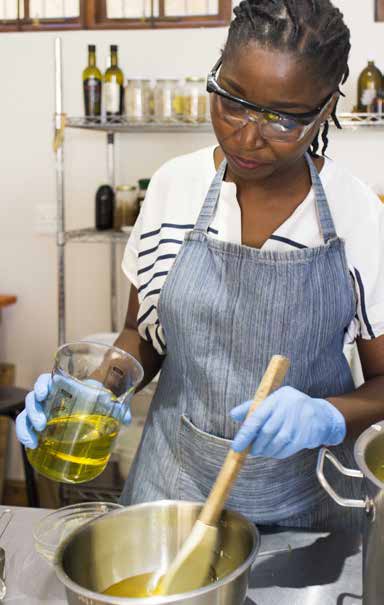
Since its launch in 2017, the fund has already helped 38 small and medium-sized enterprises (SMEs) that have collectively created over 160 jobs.
A success story
O’live makes a range of quality handmade soaps and other products, using only natural and locally-sourced ingredients. The company, owned by husband and wife team Sipho and Zikhona Tefu, is one of the fund’s success stories.
In 2011, Zikhona started making natural soap in her kitchen to help their daughter who had eczema and couldn’t use store-bought soaps as they made her skin extremely dry and her eczema flare up.
“After a lot of research, our journey into making skin-loving soaps and balms started. We didn't want to look further than our ‘backyard’, so we started sourcing only local oils,” said Zikhona.
The soap is not made from pre-bought melt and pour bases, but is lovingly made in small batches, using the cold-processed method, in O’live’s studio in Woodstock, Cape Town.
“With the support that we have received from the CDI Growth Fund over the years, I was able to turn the business from a home-based hobby into a full business. I never, in my wildest dreams, thought that this would be possible,” said Zikhona.
“The CDI’s workshops have been amazing. I spent the past two years with a mentor, who I saw every month. I could never have afforded a business coach or mentor but because of the CDI, I got that support and was able to put financial and work systems in place,” she added.
Managed by CDI Capital, the fund was incorporated as a CDI subsidiary in 2016 to set up funding for SMEs. Funding comes from the National Treasury’s Jobs Fund, the Technology Innovation Agency and the Western Cape Department of Economic Development and Tourism.
The CDI Growth Fund is open to South African-owned businesses that operate in the country and are at least one year old with a turnover or assets above R1 million.
The deadline for applications is 12 July 2019. For more information and to apply, visit www.cdicapital.co.za/GrowthFund.
Coding and robotics gets the thumbs-up from learners
Coding and robotics gets the thumbs-up from learners angenithaSouth Africa’s coding curriculum, currently in the pilot project phase, will help ensure that learners are equipped with skills for the changing world.
he introduction of robotics lessons at Simondium Primary School in Paarl has garnered great interest among pupils.
Robotics teacher Anthony Williams said pupils are so interested in the technological subject that he has had to hold lessons four days of the week.
During lessons, pupils are taught how to make robots that move. 
Williams said he uses Lego-like blocks to build the models and then shows his learners how to connect a motor to a computer which allows them to operate the model and have control over its movements.
"The introduction of robotics and coding as subjects in schools will enhance the capacity of his learners during technology, science and maths studies."
He said coding and robotics will also enable pupils to be skilled for the modern job market.
Williams’ class is made up of 80 Grade Six pupils who are grouped into classes of 20. The lessons are part of a Department of Basic Education (DBE) pilot project in which 1 000 schools are to teach coding and robotics as part of their syllabus.
The DBE’s Chief Director of Curriculum Enhancement Programmes Seliki Tlhabane said the aim of the programme is to develop the technological skills of pupils in the era of the Fourth Industrial Revolution.
Tlhabane said schools that are not part of the initial pilot but want to participate in the programme can contact their provincial education
departments.
The full pilot will start with Grades R to Three and Grade Seven in 2020, while in 2021, Grades Four to Six and Grade Eight will form part of the pilot. Grade Nine will join the pilot project in 2022.
The 2020 pilot programme will be rolled out in Gauteng, the Free State, KwaZulu-Natal, Eastern Cape and Mpumalanga.
Corruption interventions yielding results
Corruption interventions yielding results angenithaGovernment’s efforts to root out corruption continue to yield results, President Cyril Ramaphosa said during the first State of the Nation Address (SoNA) of the sixth administration.
President Ramaphosa said government has taken decisive steps to end State capture and fight corruption. These measures include strengthening the National Prosecuting Authority (NPA), Special Investigating Unit (SIU), South African Revenue Service (SARS) and State Security.
Despite this, the President said, much more work needed to be done.
“We are committed to building an ethical State in which there is no place for corruption, patronage, rent-seeking and plundering of public money.
We want a corps of skilled and professional public servants of the highest moral standards – and dedicated to the public good.
“We have asked the National Director of Public Prosecutions to develop a plan to significantly increase the capacity and effectiveness of the NPA, including to ensure effective asset forfeiture. We need to ensure that public money stolen is returned and used to deliver services and much needed basic infrastructure to the poorest communities.”
The recently set up SIU Special Tribunal is expected to start its work within the next few months to fast track civil claims arising from SIU investigations, which are currently estimated to be around R14.7 billion.
President Ramaphosa said work to rebuild and address problems of poor governance, inefficiency and financial sustainability has already begun.
He added that government had announced the reconfiguration of a number of government departments to enable them to deliver on their mandates.
“Our decision was premised on efficiency, cost-containment, cooperative governance and strategic alignment.”
He added that the process was part of a wider process of arresting the decline in state capacity and restructuring the model of service delivery so it best serves our citizens. SAnews.gov.za
Early reading is key to empowering SA
Early reading is key to empowering SA angenithaGovernment is implementing an Early Grade Reading Programme, which consists of an integrated package of lesson plans, additional reading materials and professional support to Foundation Phase teachers.
Delivering the State of the Nation Address (SONA) in Parliament, President Cyril Ramaphosa announced that the programme forms part of the broader efforts to strengthen the basic education system by empowering school leadership teams, improving the capabilities of teachers, and ensuring a more consistent measurement of progress for Grades 3, 6 and 9.
“We also have to prepare our young people for the jobs of the future. This is why we are introducing subjects like coding and data analytics at a primary school level,” President Ramaphosa said.
The President also announced that all foundation and intermediate phase teachers are to be trained to teach reading in English and the African languages, and a cohort of experienced coaches are being trained and deployed to provide high quality on-site support to teachers.
“If we are to ensure that within the next decade, every 10-year-old will be able to read for meaning, we will need to mobilise the entire nation behind a massive reading campaign.
“Early reading is the basic foundation that determines a child’s educational progress, through school, through higher education and into the work place,” the President said.
“All other interventions – from the work being done to improve the quality of basic education to the provision of free higher education for the poor, from our investment in TVET colleges to the expansion of workplace learning – will not produce the results we need unless we first ensure that children can read.
“It is through initiatives like the National Reading Coalition that we will be able to coordinate this national effort,” President
Ramaphosa. SAnews.gov.za
Fruits of success for proud landowners
Fruits of success for proud landowners angenithaWestern Cape farm workers are now landowners with responsibility, pride and big dreams, thanks to a number of government initiatives that have turned their lives around.
In the small rural town of Haarlem in the Western Cape, beneficiaries are growing success for themselves and their families, through their involvement in an apple and pear farming initiative called the Appelkloof Workers’ Trust. 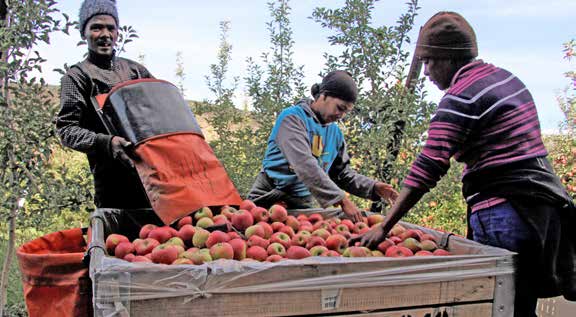
With the assistance of the National Development Agency (NDA) and government departments, 103 community members were able to buy an active apple and pear farm in 2008 that turned them into proud landowners. The farm ran into financial problems, but with a grant of R17 million from the Department of Land Affairs, the trust was able to repay its debts and start flourishing.
Today, there are 29 active members of the Appelkloof Workers’ Trust. The farm produces a wide variety of apples and pears that are supplied to South African companies and exported to the United Kingdom and Taiwan. The beneficiaries own 100 percent of the farm, which has 100 hectares of land under production.
Farm manager Patrick Cornelius, who is a beneficiary of the project, said that funding from the NDA was vital in getting the farm up and running.
He added that participants in the project have been equipped with the skills and knowledge they need to make a success of themselves.
“The project recipients received on-site training in fruit production and harvesting. They were also able to work on surrounding farms, thanks to the additional skills and knowledge that they acquired,” said Cornelius, who was a finalist in the 2016 Toyota New Harvest of the Year competition.
In addition to the trust beneficiaries, Appelkloof employs 105 people during harvest season.
“All are local, from Haarlem, so they generate money for their households and for their children,” Cornelius said.
Thamo Mzobe, CEO of the NDA, said she was proud to see how the Appelkloof project was benefitting the entire community of Haarlem.
She said the NDA is extremely focused on supporting food production initiatives, as they are key to combatting poverty.
The farm has received additional support from the National Treasury’s Jobs Fund, which has assisted with planting around 20 hectares of pear and apple
trees.
Jewellery maker strikes gold
Jewellery maker strikes gold UrsulaA young goldsmith from Limpopo hopes to launch an after-school programme to train artisans to make jewellery.
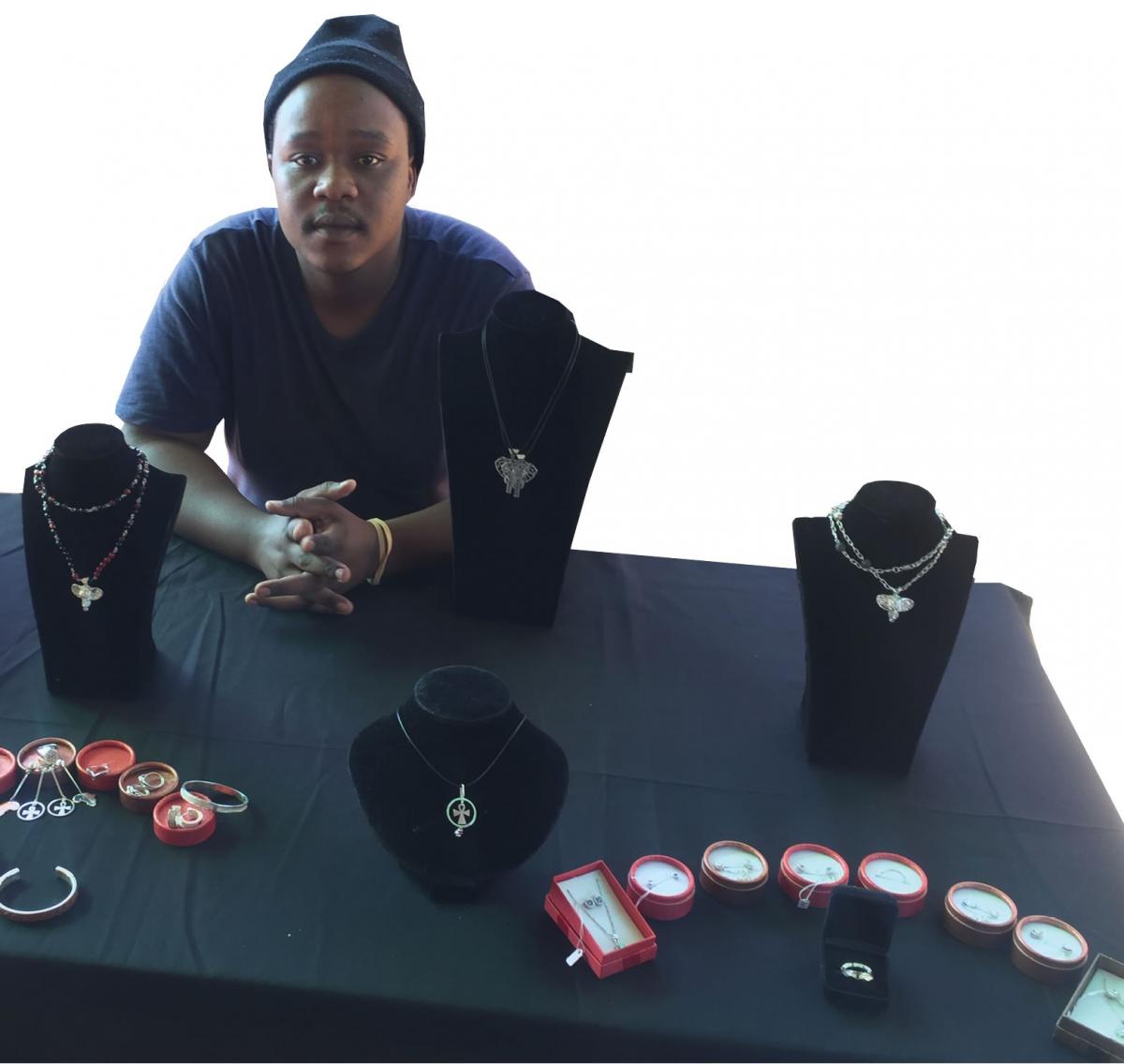 Kgaugelo Molope (24) continuously improves his jewellery-making skills by designing new pieces.
Kgaugelo Molope (24) continuously improves his jewellery-making skills by designing new pieces.
The Polokwane-based goldsmith, who operates from the Seda Limpopo Jewellery Incubator (SLJI), says artisans must always work on improving their craft and developing new skills.
“Time refines the skill… My skill right now as a goldsmith
improves with the amount of time I take to make a piece. Also, I am more efficient in terms of what we call consumables. These are the tools that break or finish quickly. I use a lot less of these,” he explained.
From 2015 to 2017 Molope trained as a jewellery maker in Italy, thanks to a scholarship from the Mining Qualifications Authority (MQA) and a National Skills Fund bursary from the Department of Higher Education and Training.
After completing his two-year studies abroad, he completed a training programme with the State Diamond Trader.
“The MQA provided students with a scholarship to Italy… After that, the MQA partnered with the State Diamond Trader, which funded the mentorship here in South Africa,” he said.
His trade certificate enables him to operate as a goldsmith, the highest recognised jewellery-making qualification in the country.
Without the SLJI his business would not exist, as he would not have the resources needed to operate it. “The SLJI is helping me with fire, which is fundamental for production,” said Molope, who uses silver, elephant hair and precious metals to create his jewellery.
The fire Molope needs to melt the materials he uses burns at about 1 000 degrees celsius.
Molope sells his products through word of mouth and via social media.
As for the future, he aims to start a trade skills development centre to train artisans who want to enter the jewellery design field. “I am trying to get an after-school programme off the ground to train artisans,” he said.
Jobs: Department of Labour - Jul 2019
Jobs: Department of Labour - Jul 2019 UrsulaRisk Management Committee Member
Centre: Department of Labour: Head Office, Pretoria
Duration: Three years contract
Reference No: HR4/19/07/01HO
Salary: Members will be remunerated according to rates approved by the Department.
Enquiries: Mr. Zwane, Tel: (012) 309 4561 Head Office, Chief Director: Human Resources Management: Private Bag X 117, Pretoria, 0001
Assistant Director: Inspection and Enforcement Services
Centre: Labour Centre: Port Elizabeth
Reference No: HR 4/4/1/120
Salary: Commencing: R 470 040.00 per annum
Enquiries: Ms. A Bezuidenhout, Tel: (041) 501 5000. Provincial Office,Chief Director: Provincial Operations: Private Bag X 9005, East London, 5201
Deputy Director: Labour Centre Operations
Centre: Labour Centre: Mthatha
Reference No: HR 4/4/1/209
Salary: All inclusive: R 869 007 per annum
Enquiries: Ms. NP Douw-Jack, Tel: (043) 701 3128. Provincial Office, Chief Director: Provincial Operations: Private Bag X 9005, East London, 5201
Principal Inspector: Employer Audit
Centre: Provincial Office: Northern Cape
Reference No: HR 4/4/8/16
Salary: Commencing: R470 040.00 per annum
Enquiries: Mr. IS Vass Tel: (053) 8381652. Provincial Office, Chief Director: Provincial Operations: Private Bag X 5012, Kimberley, 8301
Assistant Director: Labour Market Information Statistics
Centre: Provincial Office: Mpumalanga
Reference No: HR 4/4/7/22
Salary: Commencing: R 470 040.00 per annum
Enquiries: Mr. SJ Potgieter, Tel: (013) 655 8798. Provincial Office, Chief Director: Provincial Operations: Private Bag X 7263, Emalahleni, 1035
Specialist: OHS
Centre: Provincial Office: Emalahleni
Reference No: HR 4/4/7/29
Salary: All inclusive: R 869 007 per annum
Enquiries: Ms. NL Njwambe Tel: (013) 655 8775. Provincial Office, Chief Director: Provincial Operations: Private Bag X 7263, Emalahleni, 1035
Assistant Director: Communication
Centre: Provincial Office: Mpumalanga
Reference No: HR4/4/7/35
Salary: Commencing: R 376 596 per annum
Enquiries: Ms. M Mazibuko, Tel: (013) 655 8701. Provincial Office, Chief Director: Provincial Operations: Private Bag X 7263, Emalahleni, 1035
ERRATUM: Kindly note the post of Deputy Director: Public Employment Services Reference No: HR4/4/8/14 for Provincial Office: Northern Cape advertised on Vukuzenzele 2nd edition dated 14 June 2019 has been withdrawn.
Enquiries: Ms. Z Mazibuko, Tel: (053) 838 1515.
Closing date for applications: 15 July 2019
For full details of the advertised posts visit our website: www.labour.gov.za
Applications must be submitted on form Z83, obtainable from any Public Service Department or on the internet at www.gov.za/documents. The fully completed and signed form Z83 should be accompanied by a recently updated, comprehensive CV as well as recently certified copies of all qualification(s) including a Senior Certificate and ID-document [Driver’s license where applicable]. Non-RSA Citizens/Permanent Resident Permit Holders must attach a copy of their Permanent Residence Permits to their applications. Should you be in possession of a foreign qualification, it must be accompanied by an evaluation certificate from the South African Qualification Authority (SAQA). Applicants who do not comply with the above-mentioned requirements, as well as applications received late, will not be considered. The Department does not accept applications via fax or email. Failure to submit all the requested documents will result in the application not being considered. Correspondence will be limited to short-listed candidates only. If you have not been contacted within eight (8) weeks after the closing date of this advertisement, please accept that your application was unsuccessful. Suitable candidates will be subjected to a personnel suitability check (criminal record, citizenship, credit record checks, qualification verification and employment verification). Where applicable, candidates will be subjected to a skills/knowledge test. All shortlisted candidates for SMS posts will be subjected to a technical competency exercise that intends to test relevant technical elements of the job, the logistics of which be communicated by the Department. Following the interview and technical exercise, the selection panel will recommend candidates to attend generic managerial competencies using the mandated DPSA SMS competency assessment tools. Successful candidates will be appointed on a probation period of 12 months. The Department reserves the right not to make any appointment(s) to the above post. The successful candidate will be expected to sign a performance agreement. The Department of Labour is an equal opportunity affirmative action employer. The employment decision shall be informed by the Employment Equity Plan of the Department. It is the Department’s intention to promote equity (race, gender and disability) through the filling of this post(s) with a candidate whose transfer / promotion / appointment will promote representativity in line with the numerical targets as contained in our Employment Equity Plan.
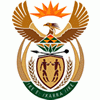
Jobs: The Department of Justice and Constitutional Development - Jul 2019
Jobs: The Department of Justice and Constitutional Development - Jul 2019 UrsulaDirector: Justice Operations & Facilities Management (4 Posts)
Ref No: 19/86/NC/CS: Centre: Northern Cape
Ref No: 19/87/GP/CS: Centre: Gauteng
Ref No: 19/88/EC/CS: Centre: Eastern Cape
Ref No: 19/92/WC/CS: Centre: Western Cape
Salary: R1 005 063 – R1 183 932 per annum (All inclusive). The successful candidate will be required to sign a performance agreement.
Requirements: Bachelor’s Degree in Public Management/Administration, or Property Management, Real Estate, Security Management or equivalent qualification (NQF7). At least 6 years’ experience of which 5 years must be at middle/senior managerial level experience; Knowledge of legislation, prescripts and Frameworks of the Public Service; Experience in Court Management will be an added advantage; Experience in Infrastructure and Property will be an added advantage; A valid driver’s licence.
Enquiries: Mr J Tope (053) 802 1300 - NC
Ms R Moabelo (011) 332 9019 - GP
Mr P Hattingh (041) 702 7000 - EC
Mr M Ketelo (021) 462 5471 - WC
Senior Legal Administration Officer (Mr-6)
Reference: 19/80/CLO
Centre: National Office, Pretoria
Salary: R473 820 – R1 140 828 per annum. (Salary will be in accordance with OSD determination). The successful candidate will be required to sign a performance agreement.
Requirements: An LLB Degree or 4 years recognized legal qualification; At least 8 years appropriate post qualification legal experience; Knowledge of the South African Legal System; Experience in providing legal support in civil matters for and against the Department; A valid driver’s license.
Enquiries: Ms. K Ngomani (012) 357 8661
Registrar
Reference: 19/68/KZN
Centre: Magistrate’s Office, Pietermaritzburg (to serve courts within Cluster B):
Salary: R198 411 – R480 921 per annum. (Salary will be determined in accordance with OSD determination). The successful candidate will be required to sign a performance agreement.
Requirements: LLB degree or recognized 4 year legal qualification; A valid driver’s license.
Enquiries: Ms C.S. Sikhonde (031) 372 3000
Closing date: 15 July 2019
Note: Interested applicants may visit the following website: www.justice.gov.za or www.dpsa.gov.za to view the full job specification of the above positions. Applications must be submitted on Form Z83, obtainable from any Public Service Department or on the internet at www.gov.za. A Z83 form & CV must be accompanied by original certified copies of qualifications, identity document and a driver’s license where necessary. A SAQA evaluation report must accompany foreign qualifications. Applications that do not comply with the above mentioned requirements will not be considered. All shortlisted candidates for SMS posts will be subjected to a technical and competency assessment. Candidate will complete a financial disclosure form and also be required to undergo a security clearance. Foreigners or dual citizenship holder must provide the Police Clearance certificate from country of origin.
The DOJ&CD is an equal opportunity employer. In the filling of vacant posts the objectives of section 195 (1) (i) of the Constitution of South Africa, 1996 (Act No: 108 of 1996), the Employment Equity imperatives as defined by the Employment Equity Act, 1998 (Act No: 55 of 1998) and relevant Human Resources policies of the Department will be taken into consideration. Reasonable accommodation shall be applied for People with Disabilities including where driver’s license is a requirement. Correspondence will be limited to short-listed candidates only. If you do not hear from us within 3 months of this advertisement, please accept that your application has been unsuccessful. The department reserves the right not to fill these positions. Women and people with disabilities are encouraged to apply and preference will be given to the EE Target.
Tel: 012 315 1111 Private Bag X81, Pretoria, 0001 Momentum Centre, 329 Pretorius Street, Pretoria

Land reform key to growth
Land reform key to growth angenithaPresident Cyril Ramaphosa says accelerated land reform in rural and urban areas and a clear property rights regime is required to ensure faster economic growth.
The President said the country cannot turn its fortunes around without a relentless focus on economic growth.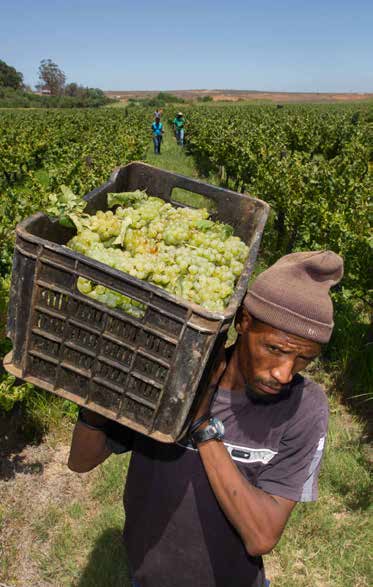
“In the immediate term, government will accelerate efforts to identify and release public land that is suitable for smart, urban settlements and for farming,” he said.
In the stimulus and recovery package announced last year, government promised to prioritise funding for emerging farmers.
Over the medium term budget period, R3.9 billion has been allocated to the Land Bank to support black commercial farmers.
The President said he had received the report of the Presidential Advisory Panel on Land Reform and Agriculture, which will now be presented to Cabinet for consideration.
“The panel’s recommendations will inform the finalisation of a comprehensive, far-reaching and transformative land reform programme,” he said.
The panel was appointed in September 2018 to support the work of the Inter-Ministerial Committee (IMC) on Land Reform, which is chaired by the Deputy President David Mabuza.
It was set up to advise the IMC on a broad range of policy matters associated with land reform, including restitution, redistribution, tenure security and agricultural support.
To support sound policy making, the panel was mandated to review, research and suggest models for government to implement a fair and equitable land reform process that redresses the injustices of the past, increases agricultural output, promotes economic growth and protects food security.
The panel, which is chaired by Dr Vuyo Mahlathi, was further expected to provide perspectives on land policy in the context of persisting land inequality, unsatisfactory land and agrarian reform and uneven urban land development.
Large retail contract for EC rural millers
Large retail contract for EC rural millers Ursula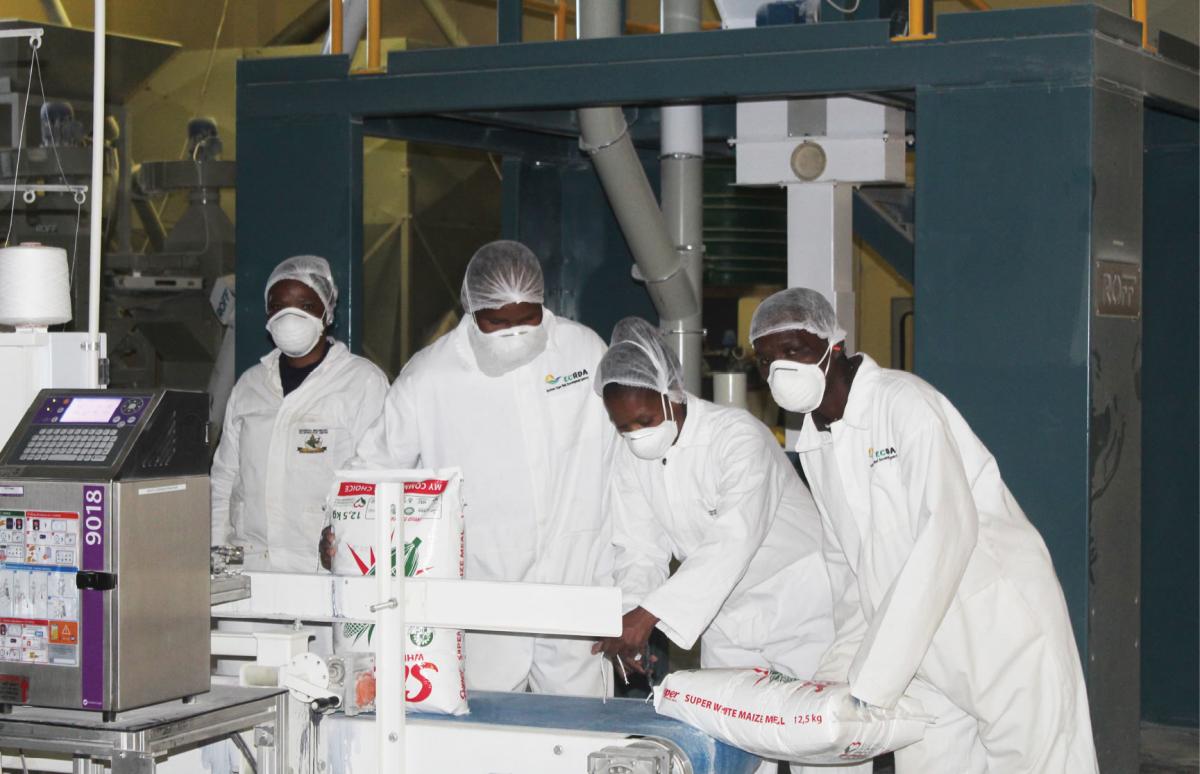 The vision of the Eastern Cape government to create sustainable rural economies is becoming a reality, with the Mqanduli Rural Economic Development (RED) Hub securing a contract to supply mielie meal to Spar outlets from Port Elizabeth to Kokstad.
The vision of the Eastern Cape government to create sustainable rural economies is becoming a reality, with the Mqanduli Rural Economic Development (RED) Hub securing a contract to supply mielie meal to Spar outlets from Port Elizabeth to Kokstad.
Chairman Sithembele Zibi said the hub – made up of 11 co-operatives with over 988 members – started supplying mielie meal to Spar Nicks Food in King William’s Town a few years ago. He explained that the extension of the contract to more Spar franchises is the break they have been waiting for.
“This adds great value to our business because we now have a steady, big customer. It’s radically different from relying on walk-ins and the occasional orders because they [Spars] expect a steady supply. The more we produce, the more we earn and the more we can increase productive capacity,” said Zibi.
He said the Spar contract would double the hub’s distribution and increase its workforce, initially on a temporary basis. “We might have to start a night shift at the milling plant to meet orders,” said Zibi.
He added that the co-operative currently has 42 employees, including eight tractor drivers, admin staff, millers and truck drivers.
Zibi said the Eastern Cape Rural Development Agency (ECRDA) has opened many doors for them and has helped them in all aspects of their business operations, including funding and hygiene standards.
He mentioned how a trade mission to Kenya, facilitated by ECRDA, allowed them to see successful co-operatives in action and then apply the knowledge learnt on return home.
ECDRA agro-processing manager Luvo Qongqo roped in First Business SA to assist the hub in penetrating the retail sector – which resulted in the eight-year Spar contract.
Qongqo, added that 24 tons have already been delivered to 24 Spar outlets in Ugies, Ngcobo, Alice, Lady Frere and Cala, among other towns.
NHI plans at advanced stage
NHI plans at advanced stage Ursula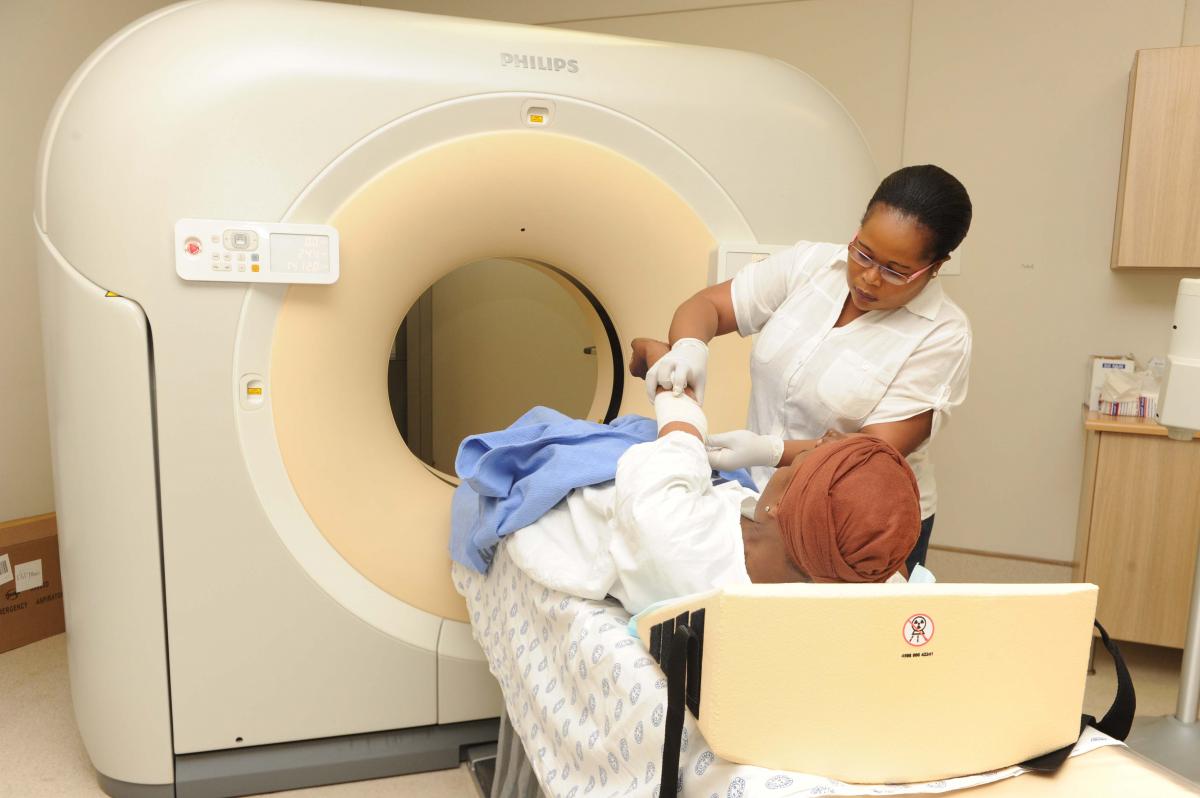 President Cyril Ramaphosa says the strategy to revise the National Health Insurance (NHI) detailed plan of implementation is at an advanced stage.
President Cyril Ramaphosa says the strategy to revise the National Health Insurance (NHI) detailed plan of implementation is at an advanced stage.
He said the plan includes accelerating quality of care initiatives in public facilities, building human resource capacity, establishment of the NHI Fund structure, and costing the administration of the NHI Fund.
Presenting the State of the Nation Address (SoNA) to a joint sitting of Parliament recently, President Ramaphosa said government will attend to the health of the nation to improve the quality of life of South Africans, reduce poverty in all its dimensions, and strengthen the country’s economy.
“We must attend to the capacity of our hospitals and clinics. An 80-year-old grandmother cannot spend an entire day in a queue waiting for her medication. An ill patient cannot be turned away because there is a shortage of doctors and nurses… A woman in labour cannot have her unborn child’s life put in danger because the ambulance has taken too long to come,” President Ramaphosa said.
As part of the work that must be urgently done to improve the quality of the health system, the President announced that government is finalising the Presidential Health Summit Compact, which draws on expert insights, and will mobilise the capabilities of all key stakeholders to address the crisis in the State’s clinics and hospitals.
Meanwhile, President Ramaphosa has raised concerns about increase in HIV infection rates, particularly among young women, and the relatively low numbers of men testing for HIV and starting treatment.
He said government will intensify its work to implement the 90-90-90 strategy to end HIV as a public health threat, which includes increasing the number of people on treatment by at least another two million by December 2020. SAnews.gov.za
One pot pasta dish
One pot pasta dish Ursula We all try to find ways to make our budget stretch much further than it can. That’s why we’ve found this hearty, but easy on your pocket dish. Everyone loves pasta and this quick, easy and delicious meal that’s packed with flavour will be a family favourite!
We all try to find ways to make our budget stretch much further than it can. That’s why we’ve found this hearty, but easy on your pocket dish. Everyone loves pasta and this quick, easy and delicious meal that’s packed with flavour will be a family favourite!
Ingredients
- 4 tomatoes, chopped
- 500g beef mince
- 1 garlic clove, finely chopped
- ½ onion, chopped
- 100ml tomato sauce
- 500g mushrooms, chopped
- 1 tbsp butter
- 1 tbsp oil
- 1 packet pasta
- Barbecue spice
- Salt and pepper for seasoning
Method
Before you start cooking, boil a kettle of water for your pasta. This will help reduce its cooking time. In a pot, add the boiled water and tablespoon of oil, season with salt and add pasta. Stir and let it boil. When cooked, strain and set aside.
In the same pot, add butter, onions, garlic and mushrooms and sauté for a few minutes. Add in the chopped tomatoes, season with salt and pepper and let simmer for 2 minutes.
Season minced meat with barbecue spice and add into the simmering sauce. Allow to cook for 20 minutes, stirring occasionally. Once cooked, remove from the stove and pour in the cooked pasta. Mix until the pasta is well coated with sauce. Once mixed set aside and plate as desired.
Play your role in fighting corruption
Play your role in fighting corruption angenithaFighting corruption is a commitment that should be made by all South Africans, in and outside the public sector.
Corruption is the abuse of public or private resources or power for personal gain.
President Cyril Ramaphosa has consistently called on all South Africans to fight corruption, fraud and collusion in the private sector with the same purpose and intensity that it is tackled in the public sector.
Earlier this year, the President said: “We must remember that every time someone receives a bribe, there is someone who is prepared to pay it. We will make sure that we deal with both in an effective manner.”
Government is committed to rooting out corruption in all forms in the private and public sector but cannot do this alone and has thus called on all citizens to play their part.
While the police and other arms of government are at the forefront of the fight against corruption, ordinary South Africans have their own role to play.
Government calls on all citizens to act decisively to end dishonest and fraudulent conduct.
As an citizen, you can help rid the country of corruption by not becoming involved in corrupt activities and reporting any corruption you suspect or are aware of.
How you can help fight corruption
Corruption is a crime and must be reported to the police.
A number of hotlines and helplines have been created by government to ensure that you can pass on information without having to reveal your identity. If the information leads to a succesful prosecution, you may be entitled to a reward. Call the Crime Stop number on 08600 10111.
Anonymous tip-offs on criminal activities can also be sent to Crime Line. You can send an SMS containing information to 32211 at a cost of R1 per SMS.
In addition to the above numbers, you can call government’s National Anti-Corruption Hotline and pass on information on corrupt activities you are aware of without giving your name. The number is 0800 701 701.
What are you doing to fight corruption in your community or your place of work?
Share your comments with us by emailing vukuzenzele@gcis.gov.za or posting them on our Facebook and Twitter pages:
Facebook: @VukuzenzeleNews
Twitter: @VukuzenzeleNews
SONA in numbers
SONA in numbers angenithaPresident Cyril Ramaphosa outlined his vision for government for the next five years, emphasising that a strong social compact was needed.
He said there was a need to forge durable partnerships between government, business, labour, communities and civil society.
As President Ramaphosa spoke about the state of the nation, a number of interesting numbers came to light.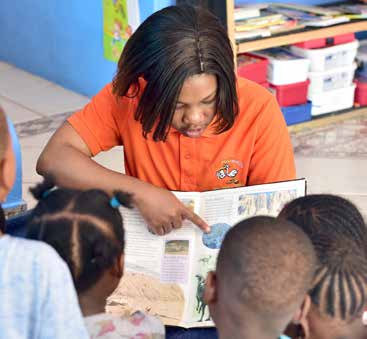
National Development Plan (NDP)
1 100 – The number of indicators that the Medium-Term Strategic Framework had for the last five years, which measured progress in the implementation of the NDP.
5 – The number of years in which the Medium-Term Strategic Framework had more than 1 100 indicators, which measured progress in the implementation of the NDP.
Government priorities and goals
7 – The number of priorities that the new administration will focus on.
5 – The number of fundamental goals for the next decade.
10 – The number of years in which government will make progress in tackling poverty, inequality and unemployment.
Employment and economic opportunities
50 percent – The unemployment rate among young South Africans.
2 million – New jobs to be created for young people within the next decade.
50 000 – The number of young people that the National Youth Service will take a year.
6 – The number of months which the national minimum wage has been in place.
155 000 – Jobs to be created in the next five years through the Public-Private Growth Initiative.
2 million -Young people who will be employed in the next decade.
Quality education
10 – The age in which a child will be able to read for meaning in the next decade.
3, 6 and 9 – The targeted school grades where there should be an improvement in the capabilities of teachers and ensuring a more consistent measurement of progress.
500 000 – The number of children of school-going age with disabilities who are not in school.
Human settlements
5 – The number of years that government will accelerate the provision of well-located housing and land to poor South Africans.
70 percent -The number of South Africans that are going to be living in the urban areas by 2030.
Access to healthcare
2 million – The figure that government aims to increase the number of people on antiretroviral treatment by December 2020.
Growing the economy
10 – The number of years in which government expects South Africa’s economy to be growing at a rate far greater than country’s population.
R230 billion – The fiscal support that Eskom will require over the next 10 years.
R300 billion – The amount of investments announced at the inaugural Investment Conference in 2018.
R250 billion – The value of projects that has entered the implementation phase.
R840 billion – The amount that the private sector has committed to invest in projects through the Public-Private Growth Initiative.
43 – Number of projects that the private sector has committed to invest in through the Public-Private Growth Initiative.
19 – Number of sectors that the private sector has committed to invest in through the Public-Private Growth Initiative.
R100 billion – The amount that government has allocated for the Infrastructure Fund.
1 day – The period it should take for companies to be registered.
R3.9 billion – The amount allocated to the Land Bank to support black commercial farmers.
Tourism
21 million – The number of international tourist arrivals projected by 2030.
Safety and security
5 000 – Number of students registered for basic training in South Africa’s police training colleges.
7 000 – The envisaged number of students to be registered for basic training in South Africa’s police training colleges per cycle over the next two intakes.
R14.7 billion – The value of estimated civil claims arising from the Special Investigative Unit investigations.
Strengthening local government
44 –The number of districts that government will focus on to speed up service delivery, ensuring that municipalities are properly supported and adequately resourced.
8 – Number of metros that government will focus on to speed up service delivery, ensuring that municipalities are properly supported and adequately resourced.
Democracy
25 –The number of years since South Africa’s democracy.
SONA: Building the SA we want
SONA: Building the SA we want angenithaNot enough jobs are being created in South Africa and our economy is not growing. These challenges rose above all others in President Cyril Ramaphosa’s State of the Nation Address (SONA). 
The President said that while remarkable progress in building a new nation has been made over the past 25 years, South Africa is confronted by severe challenges.
“Our economy is not growing. Not enough jobs are being created. This is the concern that rises above all others. It affects everyone.
“Through the elections held in May, you provided all of us with a clear mandate for growth and renewal. We have heard you,” the President said.
Creating employment
The President explained that the growth of the economy will have little value unless it creates employment on a greater scale.
“The fact that the unemployment rate among young South Africans is more than 50 percent is a national crisis that demands urgent, innovative and coordinated solutions.
“The brutal reality is that when it comes to youth unemployment, we have to run just to remain in the same place.”
The President confirmed that it’s essential to implement a comprehensive plan – driven and coordinated by the Presidency – without delay, to create no less than two million new jobs for young people within the next decade.
“This plan will work across government departments and all three tiers of government, in partnership with the private sector,” the President confirmed.
Growth and renewal
The sixth administration has put five goals and seven priorities in place to tackle South Africa’s challenges and meet the targets set out in the National Development Plan (NDP) by 2030.
“With 10 years to go before we reach 2030, we have not made nearly enough progress in meeting the NDP targets. Unless we take extraordinary measures, we will not realise Vision 2030. This means that we need to prioritise.
“It is time to make choices. Some of these choices may be difficult and some may not please everyone. In an economy that is not growing, at a time when public finances are limited, we will not be able to do everything at one time,” the President said.
The sixth administration will thus focus on economic transformation and job creation; education, skills and health; consolidating the social wage through reliable and quality basic services; spatial integration, human settlements and local government; social cohesion and safe communities; a capable, ethical and developmental state; and a better Africa and world.
“All our programmes and policies across all departments and agencies will be directed in pursuit of these overarching tasks.”
Goals for the future
“To ensure that our efforts are directed, I am suggesting that, within the priorities of this administration, we agree on five fundamental goals for the next decade,” the President said.
These goals are to ensure that no person in South Africa is hungry; the economy grows at a much faster rate than the population; two million more young people will be employed; schools have better educational outcomes and every 10-year old can read for meaning; and violent crime is halved.
“Let us make these commitments now – to ourselves and to each other – knowing that they will stretch our resources and capabilities, but understanding that if we achieve these five goals, we will have fundamentally transformed our society,” said President Ramaphosa.
To meet these goals, the President stressed that the focus should be on strengthening the social wage and reducing the cost of living; improving affordability, safety and integration of commuter transport for low-income households; accelerating the provision of well-located housing and land to poor South Africans; and attending to the capacity of hospitals and clinics.
“To address the problems of the working poor, the national minimum wage has been in place for six months and the early indications are that many companies are complying.
“The National Minimum Wage Commission is expected to conclude research on the impact of the minimum wage on employment, poverty, inequality and wage differentials by the end of September 2019,” the President said.
Pay for electricity
Another grave concern highlighted by the President is Eskom’s financial position.
With the current committed funding from government, Eskom only has sufficient cash to meet its obligations until the end of October 2019. Government will thus urgently table a Special Appropriation Bill to allocate a significant portion of the R230 billion to support Eskom’s needs over the next 10 years.
“This we must do because Eskom is too vital to our economy to be allowed to fail. We must assert the principle that those who use electricity must pay for it.
“Failure to pay endangers our entire electricity supply, our economy and our efforts to create jobs. The days of boycotting payment are over. This is now the time to build, it is the time for all of us to make our own contribution,” the President stressed.
Skills development crucial for economic growth
Skills development crucial for economic growth Ursula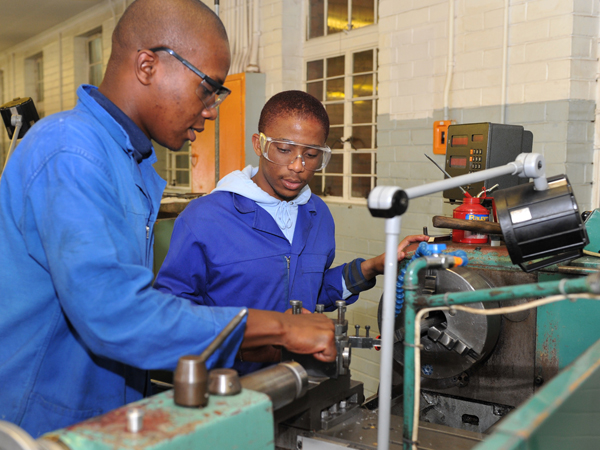 Skills development made it to the list when President Cyril Ramaphosa outlined the top seven priorities of the sixth administration during the State of the Nation Address (SoNA).
Skills development made it to the list when President Cyril Ramaphosa outlined the top seven priorities of the sixth administration during the State of the Nation Address (SoNA).
He read out ‘education, skills and health’ to be the second priority of government after ‘economic transformation and job creation’.
The President said government will expand South Africa’s high tech industry by ensuring that the legal and regulatory framework promotes innovation, scaling up skills development for young people in new technologies, and reducing data costs.
“Wherever we have gone young people have continuously raised the issue of the excessive high data costs in South Africa,” said the President.
The President said he was aware of how data costs in the country affect youth’s participation, skills development and contribution to the Fourth Industrial Revolution (4IR).
Broadly speaking, 4IR speaks to the changes that are taking place in technology. These changes bring a new way of thinking in terms of how technology is used at work, for everyday use and how people relate with one another.
He said within the next month, the Minister of Communications will issue the policy direction to the Independent Communications Authority of South Africa (ICASA) to commence the spectrum licensing process.
“This process will include measures to promote competition, transformation, inclusive growth of the sector and universal access,” he said.
“This is a vital part of bringing down the costs of data, which is essential both for economic development and for unleashing opportunities for young people,” he added.
The President also called on the telecommunications industry further to bring down the cost of data so that it is in line with other countries in the world.
Paid workplace experience
Government will expand its programmes to enable young people to gain paid workplace experience through initiatives like the Youth Employment Service, and also facilitating work-based internships for graduates of technical and vocational programmes.
President Ramaphosa said government will continue to develop programmes to ensure that economically excluded young people are work ready and absorbed into sectors where ‘jobs demand’ is growing.
These sectors include global business processing services, agricultural value chains, technical installation, repair and maintenance and new opportunities provided through the digital economy and the fourth industrial revolution.
South Africa’s investment drive intensifies
South Africa’s investment drive intensifies angenithaAs part of building “a South Africa we want”, President Cyril Ramaphosa says government will intensify its already successful investment drive.
This will build on the R300 billion worth of investments announced during the 2018 inaugural Investment Conference. Of these, just over R250 billion worth of projects have entered implementation phase.
“We continue to build a pipeline of investments, which will be showcased at the second South African Investment Conference to be held on 5 to 7 November,” said the President.
The President made the announcement at the State of the Nation Address (SoNA) held recently in Parliament.
President Ramaphosa had appointed investment envoys to search for investors with deep pockets last year.
The President’s Special Envoys on Investment include finance heavyweights such as former Finance Minister Trevor Manuel, former Finance Deputy Minister Mcebisi Jonas, the executive chairperson of Afropulse Group, Phumzile Langeni and chairman of Liberty Group and former CEO of Standard Bank Jacko Maree.
“At a time of uncertainty, the work of the investment envoys has built important bridges between government and the business community. From their feedback, it is clear that much more still needs to be done to improve the investment climate,” said the President.
This, he said, includes reviewing the way government coordinates work to resolve challenges faced by investors and reforming investment promotion policy and architecture.
The private sector has committed to invest R840 billion in 43 projects over 19 sectors and to creating 155 000 jobs in the next five years. SAnews.gov.za
Survivors of GBV are not alone
Survivors of GBV are not alone Ursula Gender-based violence (GBV) is on the increase and victims of abuse need to know that even though they often feel trapped and alone, there are ways of getting out safely.
Gender-based violence (GBV) is on the increase and victims of abuse need to know that even though they often feel trapped and alone, there are ways of getting out safely.
Identify abuse
Knowing when you are in an abusive relationship can save your life. As such, it is vital to see the signs as early as possible. These can include: being blamed for things that are not your fault and being manipulated or controlled by the abuser. The signs differ depending on the type of abuse, which includes physical, sexual, emotional, verbal, psychological or economic abuse. Intimidation, harassment, stalking and damage to property are also types of GBV.
What to do if you are injured
If you are injured during an attack, ensure that you get medical help and record your injuries, or take photos of the injuries.
If sexually abused, do not take a bath or dispose of any clothing items until all evidence is taken for DNA purposes.
How to get out
Develop an escape plan, which includes packing a bag with emergency items and finding a safe place to go. The bag must be stored safely or kept with a trusted person.
Protection order
To apply for a protection order, go to the nearest police station and report the abuse. You can then apply for a protection order which will be issued by a magistrate. You can ask the magistrate not to disclose your new residential address or to allow the abuser to enter your shared residence.
If the abuser violates the protection order, immediately report the violation to the nearest police station. Ask people you trust to call you or the police if they see the abuser entering your premises.
Where to get help
- Powa - 011 591 6803
- Childline South Africa - 0800 055 555 (toll-free)
- Famsa - 011 975 7106/7
- The Tears Foundation - 010 590 5920 or *134*7355#s
- The 24-hour GBV command centre toll-free number - 0800 428 428, or send a please - call - me to *120*7867#
Techie creates a world of wonder for learners
Techie creates a world of wonder for learners Ursula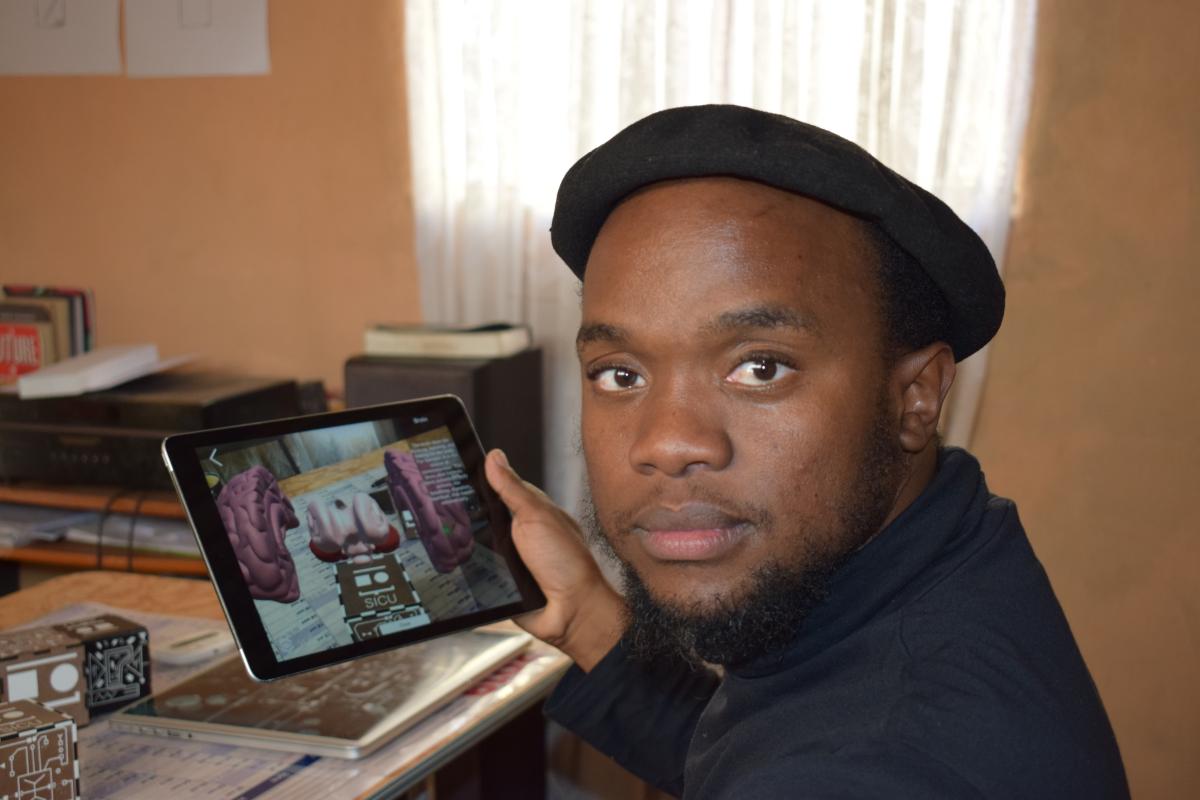 A Free State youngster is using the latest technology to make learning interactive and fun.
A Free State youngster is using the latest technology to make learning interactive and fun.
Rural and township learners in the Free State are benefiting from the creative genius of 28-year-old Mbangiso Mabaso.
Mabaso is the founder of Sisanda Tech, which runs a project called SI Realities, a virtual science laboratory that uses enhanced and virtual reality to make learning science easy, fun and engaging.
The technology allows users to perform experiments using a smartphone.
Mabaso went to a township school and realised how not having access to an operating science lab set him back while studying electrical engineering at varsity. He was determined to help others in the same situation.
The self-taught app developer realised after designing his first game that there’s more to games than just playing.
His first game, Eed, was created in 2015 and raised awareness about energy conservation. Eed came third in the SAB Kickstart Ignite competition, winning R100 000. It’s this experience that led to the development of the virtual science lab, said Mabaso.
“I thought to myself if the kids find a book boring and a game fun, why not fuse the two? The use of game mechanics makes learning fun. When a child is playing games, he could be eliciting things that he is not aware of and then using those lessons in the real world.”
Mabaso undertook many entrepreneurial projects before coming up with Sisanda Tech.
“When you get into entrepreneurship, it’s like entering a university of entrepreneurship where you’re going to write tests and fail; I have lost a lot of money in the process.
“My failures are my achievements, however, because I get to learn from those experiments,” he said.
Mabaso works with eight schools ranging from primary (Grades four to seven) to high schools (Grade 10 to 12) in Thaba Nchu and Botshabelo where he focuses on life science, natural science and technology and is planning to venture into mathematics.
“My philosophy in life relies on self-education. I believe when you match the information you get from school with self-education, it will turn into something.”
According to Mabaso, interest is the key to learning. “If you don’t have an interest in anything, you will never learn. I had an interest in developing games so I eventually learned how to do just that!” he said.
Tough action against abuse
Tough action against abuse Ursula President Ramaphosa said government was working with civil society organisations on strategies to end Gender-Based Violence (GBV) and femicide.
President Ramaphosa said government was working with civil society organisations on strategies to end Gender-Based Violence (GBV) and femicide.
“Following intensive consultations and engagements, we are working towards the establishment of the GBV and Femicide Council and a National Strategic Plan that will guide all of us, wherever we are, in our efforts to eradicate this national scourge,” said President Ramaphosa during the State of the Nation Address.
He added that violent crimes were a societal problem that required a society-wide response.
“We are capacitating and equipping the police and court system to support survivors of GBV,” he said.
President Ramaphosa added that it was important for all South Africans to feel safe
“The South Africa we want is a country where all people are safe and feel safe. Let us therefore work together to ensure that violent crime is at least halved over the next decade.”
The President went on to say that government was working to improve the success rates in investigating and prosecuting crimes, and to ensure better training and professionalisation throughout the criminal justice system.
He said government would work towards halving crime in the next 10 years. To achieve this, police visibility would be increased by employing more police officers, and to create a more active role for citizens through effective community policing forums.
“Currently, there are over 5 000 students registered for basic training in our police training colleges and we envisage that this number will be increased to 7 000 per cycle over the next two intakes. We are working to improve success rates in investigating and prosecuting crimes, and to ensure better training and professionalisation throughout the criminal justice system,” he said.
The President also announced that there were plans to step up the fight against drug syndicates through the implementation of the National Anti-Gang Strategy and the revised National Drug Master Plan.
Ushering in the sixth administration in style
Ushering in the sixth administration in style Ursula
Waste can help fill your wallet
Waste can help fill your wallet Ursula In 11 years, Deidre Nxumalo-Freeman’s recycling business has grown from a one-woman initiative into a formidable, well-diversified operation that handles a wide range of recyclables.
In 11 years, Deidre Nxumalo-Freeman’s recycling business has grown from a one-woman initiative into a formidable, well-diversified operation that handles a wide range of recyclables.
Nxumalo-Freeman’s company, DNF Environmental Services, has three buy-back centres in East London, including one in the Wilsonia industrial area, and a mobile buy-back centre. DNF also operates the Buffalo City Municipality’s (BCM) buy-back centre in the city’s North end.
She said the waste industry in South Africa contributed over R24 billion to the economy in 2016 and there is still large scope for growth.
Nxumalo-Freeman said of the 54 million tons of waste produced every year, 62 percent ends up in landfills, which are detrimental to the environment.
The DNF All Hands on Waste Recycling Programme aims to minimise and divert the amount of waste that ends up in landfills. It does this through the implementation of practical recycling solutions, said Nxumalo-Freeman.
“We mainly collect used motor oil and have a 47 000-litre tank for used oil. FFS Refiners collects the used oil and transports it to Durban for refining. We also sell used cooking oil that we collect from local businesses to bio-diesel producers.”
“We have grown so much with the support of BCM and local businesses. We service almost 2 000 vendors and on a monthly basis recycle 350 tons of waste which would have ended up in landfill sites. When I started as a consultant, it was just me and now we have 28 employees,” said Nxumalo-Freeman.
She praised the Good Green Deeds Programme launched by President Cyril
Ramaphosa in BCM in March for creating awareness about recycling in communities.
“People are now seeing the value of recycling. We collect about 20 tons from communities and expect volumes to grow."
She said community members can bring recyclables and get money in their bank account from her company.
The company also collects recyclables from schools and at the end of the year, transfers rebates into each school’s account.
You are never too old to learn
You are never too old to learn UrsulaObtaining a matric certificate was a far-fetched dream for Matshedso Masapo (71) who grew up in the farming community of Excelsior in the Free State.
Today Masapo is one step closer to achieving his life-long dream after registering at the Botshabelo Adult Learning Centre to pursue his matric.
Masapo is pursuig his dream even with the responsibilities that come with being a parent and a provider.
“My love for education is so much that I can’t just give up,” said Masapo.
He explained that everytime he tried to go back to school he was faced with challenges.
Some of the challenges that Masapo was faced with included providing for his family and being questioned by employers during the aparthied era on the reasons behind furthering his stuies. Masapo said at times he used to feel bad that he didn’t follow through with his dream earlier, but he’s now more motivated to finish the race he began more than five decades ago.
As a father of three, he admits that during the journey there was a time when he didn’t feel comfortable being taught or even tested by people who were young enough to be his children.
He adds that he has since developed respect for young people.
“Education has been an eye-opener which has allowed me to improve my life, like opening and running a tuck shop in my community.
“For me education is very important, because without it you can struggle endlesly,” he said.
A member of Botshabelo Writer’s Club, Masapo has written a Sesotho novel titled Thoteng Mora Tamolo which he self-published this year.
“Part of the reason that I keep myself in a position where I am always learning is because I want to be an outstanding writer.”
Masapo is also a pig farmer and he plans to assist other pig farmers by teaching them how to properly run their businesses, with the knowledge that he has learnt at school.
Masapo will have to wait until September to receive his results is matric results.
Young civil engineers pave the way for an exciting future
Young civil engineers pave the way for an exciting future angenithaTwo young people are creating jobs for the youth, thanks to a loan from the Industrial Development Corporation (IDC).
The owners of Maloka Machaba Surfacing, Kate Machaba and Matshela Maloka, have hired 28 people, most of whom are young, at their Polokwane-based asphalt business.
Both civil engineers are 32, and passionate about being drivers of the economy.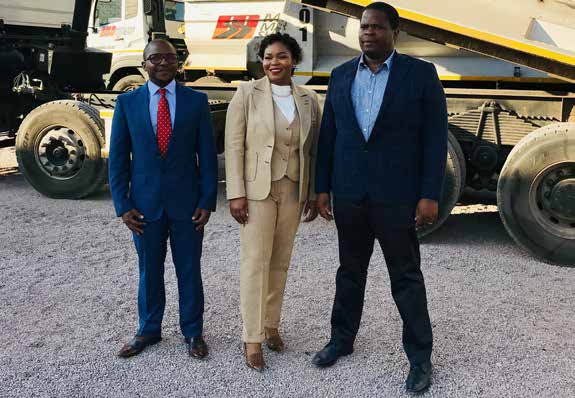
Their business offers three main services: the manufacturing, surfacing and transporting of both hot and cold mix asphalt.
Hot mix asphalt is mainly used in the construction of tar roads while cold mix asphalt is mainly used to fix potholes. Both hot and cold mix asphalt are mixed at the company’s plant and come with a certificate of approval from civil engineering testing laboratory Mocha Labs.
Maloka, who is the chief executive officer of Maloka Machaba Surfacing, said a loan from the IDC helped them buy the specialised machinery needed to
operate in the asphalt space, including trucks, pavers, rollers and distributors.
Applying for an IDC loan
The company’s loan application went through several processes at the business
funding entity.
Machaba, who is the chief operations officer, said they had to present a well-researched business plan when applying for the loan.
“Make sure that you have done your research thoroughly of the industry you want to get in to,” she said, adding that entrepreneurs should also remember that the loan has to be repaid.
Maloka Machaba Surfacing is on the road to success because of the assistance it received from the IDC.
The IDC advised applicants to ensure that their application has all the relevant documentation. If you are an entrepreneurs and you require the assistance of the IDC log on to www.idc.co.za or call them on 0860 693 888.